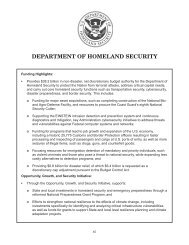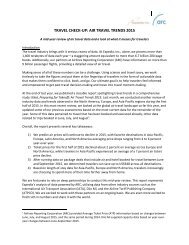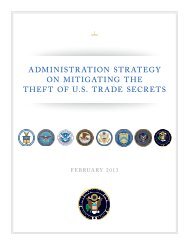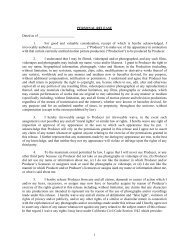A-HRC-13-42
You also want an ePaper? Increase the reach of your titles
YUMPU automatically turns print PDFs into web optimized ePapers that Google loves.
A/<strong>HRC</strong>/<strong>13</strong>/<strong>42</strong><br />
page 44<br />
number of issues, including torture. It also sanctioned the establishment of various classified<br />
programmes much more narrowly than before. 165<br />
99. The Government of the United States declared a global “war on terror”, in which<br />
individuals captured around the world were to be held neither as criminal suspects, put forward<br />
for federal court trials in the United States, nor treated as prisoners of war protected by the<br />
Geneva Conventions, irrespective of whether they had been captured on the battlefield during<br />
what could be qualified as an armed conflict in terms of international humanitarian law. Rather,<br />
they were to be treated indiscriminately as “unlawful enemy combatants” who could be held<br />
indefinitely without charge or trial or the possibility to challenge the legality of their detention<br />
before a court or other judicial authority.<br />
100. On 7 February 2002, the President of the United States issued a memorandum declaring<br />
that “common article 3 of Geneva does not apply to either Al-Qaida or Taliban detainees”, that<br />
“Taliban detainees are unlawful combatants and, therefore, do not qualify as prisoners of war<br />
under article 4 of Geneva”, and that “because Geneva does not apply to our conflict with<br />
Al-Qaida, Al-Qaida detainees also do not qualify as prisoners of war”. This unprecedented<br />
departure from the Geneva Conventions was to be offset by a promise that, “as a matter of<br />
policy, the United States Armed Forces shall continue to treat detainees humanely and, to the<br />
extent appropriate and consistent with military necessity, in a manner consistent with the<br />
principles of Geneva”. 166 This detention policy was defended by the Government in various<br />
submissions to the United Nations, 167 including on 10 October 2007, when the Government<br />
stated that the law of war, and not the International Covenant on Civil and Political Rights, was<br />
the applicable legal framework governing the detentions of “enemy combatants”, 168 and therefore<br />
such detentions did not fall within the mandate of the special procedures mandate holders. 169<br />
101. By using this war paradigm, the United States purported to limit the applicable legal<br />
framework of the law of war (international humanitarian law) and exclude any application of<br />
human rights law. Even if and when human rights law were to apply, the Government was of the<br />
view that it was not bound by human rights law outside the territory of the United States.<br />
Therefore, by establishing detention centres in Guantanamo Bay and other places around the<br />
world, the United States was of the view that human rights law would not be applicable there.<br />
Guantanamo and other places of detention outside United States territory were intended to be<br />
outside the reach of domestic courts for habeas corpus applications by those held in custody in<br />
165 A/<strong>HRC</strong>/6/17/Add.3, para. 3.<br />
166<br />
Memorandum from the President on the humane treatment of Taliban and Al-Qaida<br />
detainees, 7 February 2002, www.pegc.us/archive/White_House/bush_memo_20020207_ed.pdf.<br />
167 See for example CCPR/C/USA/CO/3/Rev.1/Add.1, p. 3; A/<strong>HRC</strong>/4/41, paras. 453 - 455; and<br />
A/<strong>HRC</strong>/4/40, para. 12.<br />
168<br />
CCPR/C/USA/CO/3/Rev.1/Add.1, p. 3.<br />
169<br />
CCPR/C/USA/3, para. 456, and A/<strong>HRC</strong>/4/40, para. 12.
















